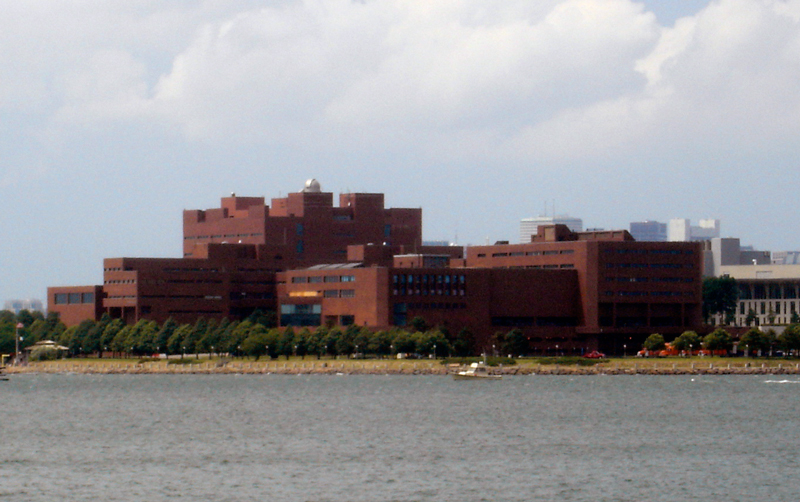
UMass Boston, viewed from Squantum Point Park in Quincy. Fullobeans/Wikimedia Commons.
The week before Thanksgiving a student group came to my undergraduate course to make a pitch. At the leafy, residential college I attended these pitches were usually to join a club, attend a particular talk, or to do some volunteer work often for the city’s less fortunate. The student group that came to my class at UMass Boston did aim to help the less fortunate: their fellow students. The young organizers wanted their colleagues to be aware of the on-campus food bank available to them and, if my students were not food insecure, to request donations in advance of the Thanksgiving holiday.
UMass Boston is one of the nineteen public colleges and universities in Massachusetts (of 29) that runs a food bank or distributes food to students in need on-campus. You read that right. There is enough hunger and food insecurity among college students at public universities in the Commonwealth that just about 66% of our state schools have free, on-campus food supports.
This assistance is not just around the holidays – need lasts year-round. At UMass Boston, for instance, the pantry is open twice weekly for enrolled students who apply for assistance. They can pick up groceries weekly as well as other donated household items. And to be clear, the students who attend MA public colleges and universities are almost exclusively MA residents – 95% at UMass Boston, 79% at UMass Amherst, and 96% at UMass Dartmouth. The state average for first-year students is 92% MA residents. By contrast, only 24% of Boston College students are from MA. The vast majority of those attending Massachusetts public colleges are therefore Massachusetts residents and the majority of these also reside in the Commonwealth after they graduate. A substantial portion of them are, quite literally, hungry.
The Massachusetts Department of Higher Education reports these pantries and related programs are often necessary because students in the Commonwealth face the dilemma of paying for tuition and paying for a meal. This is not a uniquely Massachusetts problem but we are sadly unique in how deeply felt the problem is here.
The reasons for the relatively high levels of food insecurity, and high debt levels among college students at our public institutions compared to local private colleges, is that Massachusetts simply does not invest in public higher education in ways remotely commiserate with our progressive reputation. We like to highlight our test scores in primary education, but as the Massachusetts Budget and Policy Center found our support of higher education is nothing to brag about. And it is the students who suffer. From fiscal years 2001-13, Massachusetts cut higher education funding by 25% -- more than all but six states. We are 48th among the fifty states in terms of investment in higher education as a percentage of income. The gaps are made up with tuition and, most especially, fee increases. Governor Patrick has made recent investment in high education but “Massachusetts still ranks 26th among the states in funding per full-time student and 46th in state spending on need-based financial aid.”
These facts help explain the preponderance of food pantries on our campuses. Yes, the majority of our students do not need this assistance but that so many do challenges the romanticized image of college so many still hold. In the Bay State, for the very kids who grew up here and regularly stay here, a public education is intellectually empowering but comes with substantial indebtedness and stark day-to-day choices.
Some will say trade school is the answer. Others will say cut salaries. I can tell you from experience that faculty salaries are not driving up cost – one has to want to work here (as I do) because job offers in other states paid better. And while trade school can be a superb option, the empowerment one feels – especially as a first-generation college student upon graduation -- is wholly transformative. Watching it is the highlight and great privilege of my career. But in a state as affluent and educated as Massachusetts, knowing that the degree required hunger for too many and indebtedness for most is deeply problematic.
The more popular argument for funding higher education is the shortage of college graduates Massachusetts faces in coming decades if current patterns hold and what this will mean for economic growth. This argument matters. And so do food pantries for MA kids, at MA colleges, who are apt to make MA their home as adults.

